
William James Dixon was an American blues musician, vocalist, songwriter, arranger and record producer. He was proficient in playing both the upright bass and the guitar, and sang with a distinctive voice, but he is perhaps best known as one of the most prolific songwriters of his time. Next to Muddy Waters, Dixon is recognized as the most influential person in shaping the post–World War II sound of the Chicago blues.
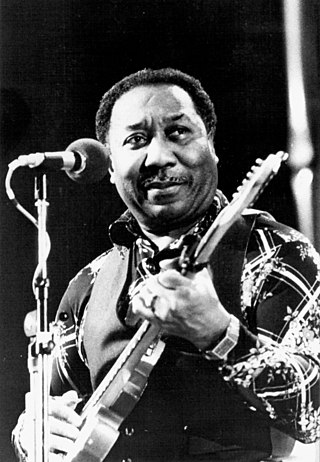
McKinley Morganfield, known professionally as Muddy Waters, was an American blues singer and musician who was an important figure in the post-World War II blues scene, and is often cited as the "father of modern Chicago blues". His style of playing has been described as "raining down Delta beatitude".

Chester Arthur Burnett, better known by his stage name Howlin' Wolf, was an American blues singer and guitarist. He was at the forefront of transforming acoustic Delta blues into electric Chicago blues, and over a four-decade career, recorded blues, rhythm and blues, rock and roll, and psychedelic rock. He is regarded as one of the most influential blues musicians of all time.
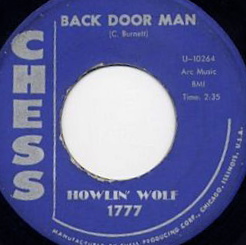
"Back Door Man" is a blues song written by American musician Willie Dixon and recorded by Howlin' Wolf in 1960. The lyrics draw on a Southern U.S. cultural term for an extramarital affair. The song is one of several Dixon-Wolf songs that became popular among rock musicians, including the Doors who recorded it for their 1967 self-titled debut album.

Moanin' in the Moonlight is a compilation album and the first album by American blues artist Howlin' Wolf, released by Chess Records in 1959. It contains songs previously issued as singles, including one of his best-known, "Smokestack Lightning". Rolling Stone ranked it number 477 on its 2020 list of "the 500 Greatest Albums of All Time".
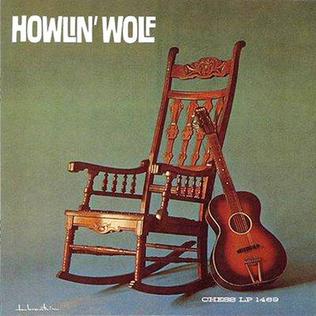
Howlin' Wolf is the second album from the Chicago blues singer/guitarist/harmonicist, Howlin' Wolf. It is a collection of twelve singles previously released by the Chess label from 1960 through 1962. Because of the illustration on its sleeve, the album is often called The Rockin' Chair Album, a nickname even added to the cover on some reissue pressings of the LP.

"Goin' Down Slow" or "Going Down Slow" is a blues song composed by American blues singer St. Louis Jimmy Oden. It is considered a blues standard and "one of the most famous blues of all".
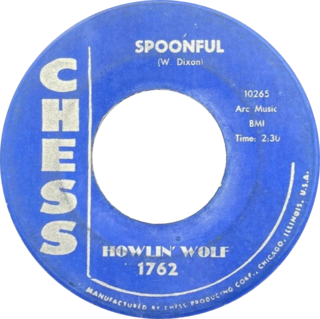
"Spoonful" is a blues song written by Willie Dixon and first recorded in 1960 by Howlin' Wolf. Called "a stark and haunting work", it is one of Dixon's best known and most interpreted songs. Etta James and Harvey Fuqua had a pop and R&B record chart hit with their duet cover of "Spoonful" in 1961, and it was popularized in the late 1960s by the British rock group Cream.

"Smokestack Lightning" is a blues song recorded by Howlin' Wolf in 1956. It became one of his most popular and influential songs. It is based on earlier blues songs, and numerous artists later interpreted it.
"Wang Dang Doodle" is a blues song written by Willie Dixon. Music critic Mike Rowe calls it a party song in an urban style with its massive, rolling, exciting beat. It was first recorded by Howlin' Wolf in 1960 and released by Chess Records in 1961. In 1965, Dixon and Leonard Chess persuaded Koko Taylor to record it for Checker Records, a Chess subsidiary. Taylor's rendition quickly became a hit, reaching number thirteen on the Billboard R&B chart and number 58 on the pop chart. "Wang Dang Doodle" became a blues standard and has been recorded by various artists. Taylor's version was added to the United States National Recording Registry in 2023.

"Little Red Rooster" is a blues standard credited to arranger and songwriter Willie Dixon. The song was first recorded in 1961 by American blues musician Howlin' Wolf in the Chicago blues style. His vocal and slide guitar playing are key elements of the song. It is rooted in the Delta blues tradition and the theme is derived from folklore. Musical antecedents to "Little Red Rooster" appear in earlier songs by blues artists Charlie Patton and Memphis Minnie.

I Am the Blues is the sixth studio Chicago blues album released in 1970 by the well-known bluesman Willie Dixon. It is also the title of Dixon's autobiography, edited by Don Snowden.
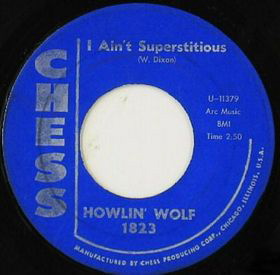
"I Ain't Superstitious" is a song written by bluesman Willie Dixon and first recorded by Howlin' Wolf in 1961. It recounts various superstitions, including that of a black cat crossing the pathway. The song has been recorded by a number of artists, including Jeff Beck, whose blues rock adaptation in 1968 was named one of Rolling Stone magazine's "100 Greatest Guitar Songs of All Time".
Joseph Leon "Jody" Williams was an American blues guitarist and singer. His singular guitar playing, marked by flamboyant string-bending, imaginative chord voicings and a distinctive tone, was influential in the Chicago blues scene of the 1950s.
"I'm Ready" is a blues song written by Willie Dixon and first recorded by Muddy Waters in 1954. It was a hit, spending nine weeks on the Billboard R&B chart where it reached number four. The song became a blues standard and has been compared to "Hoochie Coochie Man", the standard also written by Dixon that Waters recorded earlier in 1954.

The Howlin' Wolf Album is the first studio album by Howlin' Wolf, released in 1969. It features members of Rotary Connection as his backing band. The album mixed blues with psychedelic rock arrangements of several of Wolf's classic songs. Howlin' Wolf strongly disliked the album, which is noted on the album's cover art. The album peaked at number 69 on Billboard magazine's "Black Albums" chart.

"Forty-Four" or "44 Blues" is a blues standard whose origins have been traced back to early 1920s Louisiana. However, it was Roosevelt Sykes, who provided the lyrics and first recorded it in 1929, that helped popularize the song. "Forty-Four," through numerous adaptations and recordings, remains in the blues lexicon eighty years later.

His Best is a greatest hits album by American blues musician Howlin' Wolf. The album was originally released on April 8, 1997, by MCA/Chess Records, and was one of a series of releases by MCA for the 50th anniversary of Chess Records that year. Ten years later – on April 17, 2007 – the album was reissued by Geffen Records as The Definitive Collection.
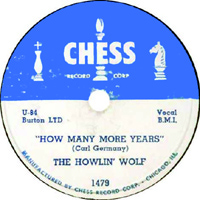
"How Many More Years" is a blues song written and originally recorded by Howlin' Wolf in 1951. Recorded at the Memphis Recording Service – which later became the Sun Studio – it was released by Chess Records and reached No. 4 on the Billboard R&B chart. Musician and record producer T Bone Burnett has described "How Many More Years" as "in some ways ... the first rock’n’roll song". It was a double-sided hit with "Moanin' at Midnight", which reached No. 10 on the R&B chart.

"Moanin' at Midnight" is a blues song written and recorded by Howlin' Wolf in 1951. The recording was released on Chess Records as his debut single. It charted on Billboard's R&B chart, but the B-side, "How Many More Years," became the popular side of the record.

















